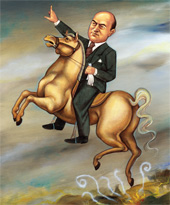Act quickly if you wish to take advantage of the internships indicated below.
Summer Internship in Washington D.C: Still accepting applications
Sweet, Stephen [Stephen.Sweet@cgkfoundation.org]
Sent: Thursday, March 11, 2010 8:12 PM
To:
Merton D. Finkler
Attachments:
Dr. Finkler,
I wanted to alert you that several great (and unexpected) internship positions have just became available in this summer’s Koch Internship Program, so we are going to continue accepting applications from interested candidates for a few more days. Please let your students know that this paid opportunity ($13.00/hr) is still available for those who are interested in gaining valuable professional experience in an organization that advocates free-market principles. Candidates who want to be considered for the program have until March 17th to submit their application materials. I will be available to answer any questions about the internship, so feel free to circulate my contact information.
Thank you!
Steve
Stephen Sweet
Program Coordinator, Marketing and Recruiting
Charles G. Koch Charitable Foundation
www.cgkfoundation.org
Ph: 202.215.7491





 Well, the future of pedagogy has arrived in the form of
Well, the future of pedagogy has arrived in the form of  Jay Dansand and the gang for transporting the site.
Jay Dansand and the gang for transporting the site.